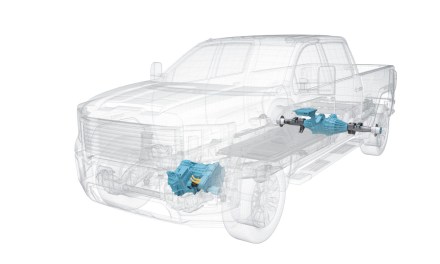Theion GmbH, the Berlin-based battery startup focusing on lithium-sulfur batteries, today announced the nomination of Dr. Gerhard Cromme for Chairman of its Advisory Board. He has a long track record at large industrial companies like ThyssenKrupp AG and Siemens AG as well as in the role of investor and advisor to car-retailing startups such as tech unicorn Auto1 Group SE. He joins a Theion Board reinforced with two additional members: Stine Rolstad Brenna and Osman Dumbuya.
“The huge number of batteries needed within the next few years require a smart material supply which is based on a smart battery cell design,” said Cromme. “Theion convinced me that sulfur—without mining, at low cost, and at a high energy density—is by far one of the best choices for a powerful battery and with locally secured supply.”
Theion is entering the mobile battery market with a unique solution for the biggest energy storage problems in the world. The company designs and produces what it calls Crystal Batteries for applications from aerospace, portable devices, and wearables, to vehicles on the land, at sea, and in the air.
The company is backed by Lukasz Gadowski, Founder, CEO, and Principal Investor at Team Global, a technology holding company that invests in and starts “frontier” technology companies. With a successful track record that includes Delivery Hero and recent investments into Volocopter, Zapata, and AutoFlight, it says that the addition of Theion to its portfolio is highly synergetic.
“At a time when industry demand for batteries is surging, but materials cost and sustainable sourcing are experiencing volatility, Theion’s breakthrough is ideally timed,” said Gadowski. “Theion’s Crystal Battery is perfect for all mobility applications, while being massively sustainable, and is targeting to extend the use time of handheld devices, the driving range of electric cars, and the safe flight time of eVTOL applications and electric aircraft by a factor of three. When in full production, it has the potential to replace every battery in every mobility device on earth.”
Earlier this year, Theion announced the appointment of Dr. Ulrich Ehmes as CEO and the upcoming commercial availability of the Crystal Battery for applications beginning with the aerospace sector.
By using sulfur in its crystal form—an abundantly available material without harmful mining and at 99% lower cost than state-of-the-art cathode materials—its cells are targeting triple the energy density of incumbent solutions, extending usage time and range by a factor of three. The sulfur replaces cathode materials with high processing costs and high content of materials like nickel and cobalt.
Besides bringing the cycle life of the cells to standard levels, the company says that its proprietary sustainable production processes require 90% less energy to produce, from raw material to finished cells, and with less space and CapEx than current gigafactories, while delivering comparable output.
Under Ehmes’ leadership, the company aims to leverage his decade-long experience in the battery-manufacturing sector to scale production.
“I joined Theion because I am convinced that selecting the right battery active materials and processing these materials in a way that best leverages the material’s storage property, will disrupt the battery industry to another level,” said Ehmes. “With 16 patents pending, our process innovations are scalable, and will bring a new dimension of mobility, range, usage time, and sustainability.”
Theion’s patented production process extends the cycle life of batteries by combining sulfur’s crystal material properties with carbon nanotubes and a proprietary solid electrolyte. The company will be shipping material later this year to aerospace customers as part of the qualification stage. Then it is on to aircraft, air taxis, drones, mobile phones, and laptops, before servicing the electric flight and automotive sectors in 2024.
“We are using mother nature’s crystals under the guidance of our patented processes to unlock sulfur’s full potential as an energy carrier,” said Marek Slavik, Theion Co-founder and CTO. “Its wide abundance around the world is crucial to the material cost. The design of our highly energy efficient manufacturing processes makes our Crystal Batteries fully sustainable.”
Diving a little deeper, Theion says its Crystal Battery has high capacity, with up to triple the gravimetric and volumetric energy density; long cycle life of lithium-sulfur brought to new levels; and fast charging, with intrinsically high C-rate charging within minutes. It has no inflammable components and benefits from the material costs of as little as €0.20 /kg compared to state-of-the-art NMC811 cathode material’s at €20.00/kg.
Theion grows a pure sulfur wafer by its Direct Crystal Imprinting method—with no slurry coating, solvents, water, or drying—directly from molten sulfur in a few seconds. Because of the flexibility of the process, the company says it can grow any geometrical shape of wafer adapted to a customer’s product shape, but it suggests a hexagonal shape for space-efficiency reasons.
The company’s product roadmap for first customer samples is 2022 for space, 2023 for air, 2023 for mobiles and wearables, and 2024 for automotive and electric flight. Its technology roadmap for serial production is 2022 for a kW·h lab line, 2023 for MW·h small-scale production line, 2025 for a GW·h large-scale production line, and 2027 for extra-large-scale production lines.
The company operates three locations in Berlin specializing in cell design, prototyping, and testing. The company is expanding by adding manufacturing facilities to accelerate its mass production roadmap, beginning in Berlin. Locations for later gigafactories are not yet determined but will be located close to its customers, with production sites envisioned in Europe, Asia, and the U.S.
- Theion sulfur crystal for batteries under the microscope.
- Ulrich Ehmes is Theion’s CEO.
- Marek Slavik is Theion’s Co-founder and CTO.
- Theion scientist prepares next cohort of lithium-sulfur test cells.






























































































